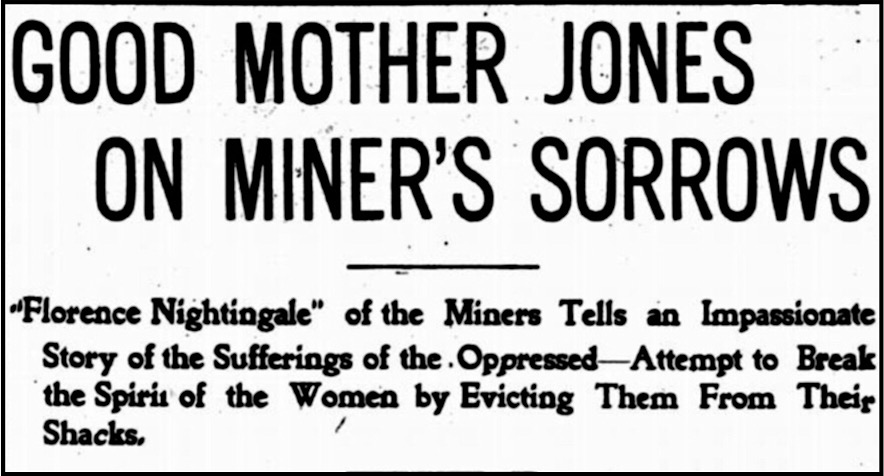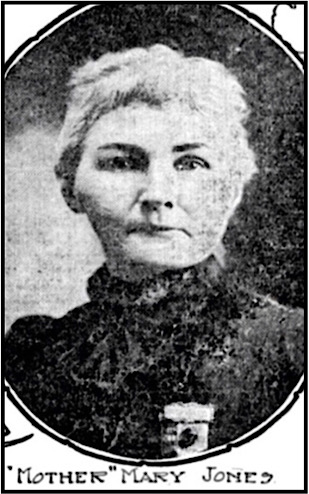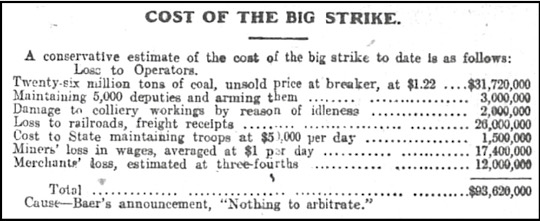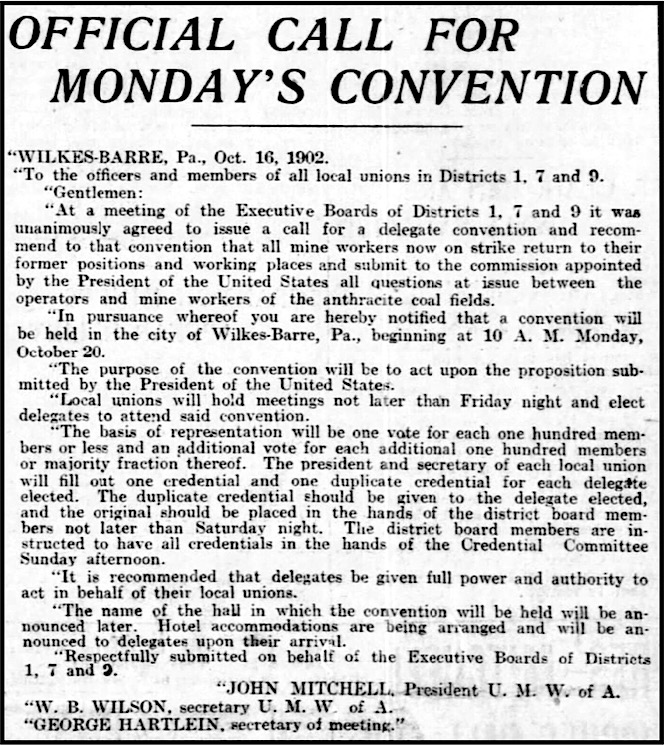 —————
—————
Hellraisers Journal – Sunday November 16, 1902
Mother Jones News Round-Up for October 1902, Part II
Found Describing Miner’s Sorrow; Assist Efforts to Settle Anthracite Strike
From the Duluth Labor World of October 11, 1902:
[Mother Jones stated:]
If Christ came to America, took advantage of the best university education the country affords, then went into the anthracite and West Virginia mining regions he never would be able to write a book which could properly convey to the minds of its readers the horrors that surround the lives of miners. The human tongue cannot tell of the miseries that blast the lives of those who earn a living in the bowels of the earth, nor of the sufferings of their unfortunate wives and children. My hair is white and I am burdened with the weight of many years, but while I have strength enough left to use my voice it will be lifted in behalf of those miners whose lives have been ruined and who have been made slaves through the avarice of those who not only believe but declare boldly they have a divine right to the earth and the fullness thereof.
A woman of small stature, credited with having spent three-score years and ten on earth, spoke as above. Her hair is white, but her form is erect. Fire flashed from her eyes and her voice trembled with emotion as she told of her experiences with the miners. “
[She further said:]
I have spent years with them. I have lived in their homes, have partaken of their scant, coarse fare, have wept with them by the deathbeds of their loved ones, have shared their sorrows, but alas, I cannot say that I ever rejoiced with them. Joy is unknown in the mining regions of West Virginia, as far as the miners and their unfortunate families are concerned.
The speaker was “Mother” Jones, the idol of the miners, who have spent the greater part of her life in an effort to organize them and improve their conditions. She is lecturing in several towns on the conditions of the miners in the anthracite regions of Pennsylvania and in West Virginia.
Any reference to West Virginia roused the champion of the miners.
When asked “How do the miners get along in West Virginia? She answered:
How do they live? they don’t live-they exist. Harriet Beecher Stowe never drew a picture of slavery that compares with the conditions of the miners in West Virginia. The wage slavery of that state is the blackest page in American history. I tell you, you people in the north can’t realize the amount of human misery that exists among the unfortunates with whom I have made my home for years.
“How are the miners housed?” she was asked. “
[She cried:]
Housed? Housed, did you say? Why, cattle may have decent roofs over them, but the shacks they call homes among the mines of West Virginia would not be tolerated in the worst sections of your city. They are are not houses—they consist of six boards, a bundle of shingles and half a pound of nails. Such are the homes the West Virginia miners when they are working, but many of them at present have only heaven for a roof and the ground for a pillow.
The coal operators do not propose to let the strikers indulge in the luxury of a board roof, and men, woman and children have been driven out to die on the mountain sides. At Piney Ridge three weeks ago I saw a mother with her babe, 6 months old thrown out of the shack called home by the officers of the law. An old, gray headed grandmother was thrown out with them.
The feeble old grandmother took the babe on her lap and with tears streaming down her cheeks said: “My poor babe, how soon they have begun to persecute you!”
Three hours later the babe died under God’s sunlight. I could recite hundreds of cases just as bad as this. They thought they would break their spirits when they threw them out of the shacks, but the woman and children in many cases have been given shelter in barns and the men can live on the mountain sides until the fight is won.
[She continued:]
The children are the worst sufferers, and their sufferings prompt some of the strikers to seek employment elsewhere. Just as I started for Iowa one of the strikers came to me and said: “Mother, I would like to stay and fight, but I’ve got twins 4 months old and I’m afraid I’ll have to go and get work some other place so can buy malted milk for them or they’ll die.” I said: “You stay here, Jack, and fight and when I get to Iowa I’ll sell books and get the money which I will send to you and you can buy malted milk for the babes.” Tears ran down the cheeks of the poor fellow as he grasped my hand and said: “If you’ll do that mother, I’ll stay and fight to the end. T’hey can’t lick us.”
The miners will win. They have come to the conclusion that they might as well starve striking as working and they will stick to the last.
[Photograph added.]
From the Elmira Daily Gazette and Free Press (New York) of October 14, 1902:
SAYS MINERS WILL NOT ACCEPT
———-
“Mother” Jones Feels Confident They Won’t Agree to
Operators’ Terms and Mitchell Remains Silent.
———-Wilkesbarre, Pa., Oct. 14.-Very naturally President Mitchell was in good natured mood [regarding possibility of settlement of the anthracite strike], even though he remained in strike headquarters with twenty newspaper men until 2 a. m. receiving and answering telegrams and messages. When he retired no one in the room but himself and his stenographer Miss Morris, knew the tenor of these messages. The foreign correspondents frequently besieged Mitchell for some information to wire their papers, but to all inquiries his answer was: “Wait, nothing yet; have patience.”
At 2 a. m. he said he guessed it was time to retire and bade all goodnight promising to be up early. At 7:30 he was ready for breakfast and as he stepped from the elevator he was surrounded by the reporters, but smiling said:
“Well, boys, you’re up early, too, but nothing official has been received yet; I believe that a messenger is on the way from President Roosevelt with official information regarding the matter which is so important to us all, particularly to the mine workers of America. Until he, or an official telegram arrives, it would not be proper for me to make any statement.”
The newspaper men had formulated a list of questions and appointed one of their number to act as spokesman. There were six questions in all, each very brief, but Mr. Mitchell replied to none of them. His only answer after all of them were asked, was: “I have nothing to say; there is nothing to say; have patience.”
“Mother” Jones arrived here to-day. The only statement she would make was:
I do not believe that the miners will accept the proposition exploited in this morning’s newspapers; I feel confident that they won’t.
The news, however, appeared encouraging to her
From The Cincinnati Enquirer of October 16, 1902:
“MOTHER” JONES
—–
Will Speak on the Strike at
Cosmopolitan Hall To-Night.The committee having charge of the labor demonstration at Cosmopolitan Hall to night in aid of the anthracite miners met last evening and completed the arrangements for the meeting.
“Mother” Jones, who has gained a national reputation for her many sacrifices in behalf of the miners and her sturdy advocacy of their cause, will be the principal speaker.
“Mother” Jones spoke in this city some weeks ago at a meeting of the Central Labor Council, but this will be her first public appearance, and as there is a widespread desire to hear and see her there is little doubt but what the hall will be crowded to the doors.
Seats will be reserved for ladies and their escorts, and while admission will be free contributions in behalf of the miners, no matter how small in amount, will be gratefully received by the committee, which is making dally remittances to the Pennsylvania miners.
Nearly 50 members of the Musicians’ Protective Association have donated their professional services for the meeting and, led by Prof. Jacob Schmalz, will render a pleasing and entertaining programme. Master Harry Kahn, tho famous boy cornetist, has also volunteered for the occasion and will be heard in several choice selections.
From The Cincinnati Enquirer of October 17, 1902:
DISAPPOINTED
———-
Was Large Audience
———-
That Assembled To Hear “Mother” Jones,
Last Evening-Good Sum Realized For Miners.
———-The large audience which assembled at Cosmopolitan Hall last night to hear “Mother” Jones speak on the miners’ strike were disappointed, for at 5 p. m. yesterday Frank L. Rist, Chairman of the meeting, received a telegram from John Mitchell, stating that unlooked-for occurrences would prevent Mrs. Jones from being present.
Mr. Rist, in making the announcement last evening, stated it as his belief that the miners’ officials, knowing her influence with the men, had kept her in the anthracite field to help hold them in line while the present negotiations for a settlement of the strike are going on, and that her best work for the cause would be accomplished in this way.
Notwithstanding her absence the meeting was a very interesting one…..
A collection was taken up which netted a handsome amount and which will be forwarded to-day…..
From the Wilkes-Barre Daily News of October 17, 1902:
—–
—–
WHY MORGAN INTERFERED.
The history of how J. Pierpont Morgan come to interfere in the anthracite strike was given to the News correspondent last night by Mother Jones. It will be remembered that she preceded Mitchell to New York, on the occasion of the trip of the president of the United Mine Workers and the three district presidents to New York, at the time of the conference between Governors Odell, and Stone, and Senators Quay, Penrose and Platt. Her errand was to see Nathan Strauss, the philanthropist, with whom an engagement had been made through a friend of the mine workers in New York. Mr. Strauss’ interest in the strike was largely from the humanitarian point of view, because of the intense suffering that its prolongation would bring to the poor. He was anxious to see the conflict at an end and his sympathies were with the strikers.
On meeting Mother Jones, he inquired how he could be of service in the conflict.
[Her response was:]
Have the operators concede the demands of the miners.Mr. Strauss’ next query was as to whether or not Mr. Mitchell would accept a promise from Mr. Morgan that he would do the right thing by the miners. Mother Jones informed him that she was sure that Mr. Mitchell would have faith in Mr. Morgan’s word, but that he had not the power of accepting it, as that would have to be presented to the miners, of whom he was the representative.
Strauss subsequently called upon Morgan and told of his conversation with Mother Jones, and of his desire that the great financier should step in and settle the conflict. Mr. Morgan agreed to interfere, saying that he knew that neither Mother Jones nor Strauss had any ulterior object to serve and that their pleading was from purely humanitarian reasons.
The now famous conference on the yacht followed and was succeeded by another interview between Mr. Strauss and Mr. Morgan, at the latter’s house, 209 Madison avenue, which resulted in a declaration by the financier that if the miners would return to work he would promise to do the right thing by them, and that he was willing to pledge every dollar in the world for the fulfillment of the promise.
Mr. Strauss then sent his secretary, Mr. Burns, to Mr. Mitchell, to inquire if the latter would accept Mr. Morgan’s word. Mr. Mitchell responded that he would, but that it would be necessary to call a convention of the mine workers before the strike could be declared off.
The reply was satisfactory to Mr. Morgan, who on the following Monday went to Washington and saw President Roosevelt. The conference between the President, the miners’ officials and the operators followed, the negotiations then begun, ending in the arbitration plan upon which the convention of mine workers will take action on Monday next……
“Mother” Jones expressed her satisfaction by saying:
It is a great victory for my boys. The people of America have been examining the records, and they have found that Mr. Baer’s title to the earth was faulty; that the lawyer who drew it up did not understand his business. The United Mine Workers of America stepped in and found the claim unconstitutional.
From The Philadelphia Inquirer of October 17, 1902:
Note: Emphasis added throughout.
~~~~~~~~~~~~~~~~~~~~~~~~~
SOURCES & IMAGES
Quote Mother Jones, Coming of the Lord, Cnc Pst p6, July 23, 1902
https://www.newspapers.com/image/761305973/
The Labor World
(Duluth, Minnesota)
-Oct 11, 1902
https://chroniclingamerica.loc.gov/lccn/sn78000395/1902-10-11/ed-1/seq-1/
Elmira Daily Gazette and Free Press
(Elmira, New York)
-Oct 14, 1902
https://www.newspapers.com/image/275450644/
The Cincinnati Enquirer
(Cincinnati, Ohio)
-Oct 16, 1902
https://www.newspapers.com/image/32427730/
-Oct 17, 1902
https://www.newspapers.com/image/32427750/
Wilkes-Barre Daily News
(Wilkes-Barre, Pennsylvania)
-Oct 17, 1902
https://www.newspapers.com/image/425941064/
The Philadelphia Inquirer
(Philadelphia, Pennsylvania)
-Oct 17, 1902
https://www.newspapers.com/image/168414981/
IMAGE
Mother Jones , Phl Inq p24, June 22, 1902
https://www.newspapers.com/image/168338244/
See also:
Whereabouts and Doings of Mother Jones for October 1902
Part I: Speaks in Iowa, Takes Part in Anthracite Strike Conference in New York
Oct 11, 1902, The Labor World p1
“Coal Miners Desire Assurance Before Terminating Strike”
https://chroniclingamerica.loc.gov/lccn/sn78000395/1902-10-11/ed-1/seq-1/
Autobiography of Mother Jones
Chapter 8 – Roosevelt Sent for John Mitchell
https://archive.iww.org/history/library/MotherJones/autobiography/8/
The strike of the anthracite miners which started in the spring with $90,000 in the treasury, ended in the fall with over a million dollar in the possession of the United Mine Workers The strike had been peaceful. The miners had the support of the public. The tie up of the collieries had been complete. Factories and railroads were without coal.
Toward fall New York began to suffer. It October, Mr. Roosevelt summoned “Divine Right Baer,” President of the Coal Producers Union, and other officials of the coal interests to Washington. He called also the officials of the miners’ union. They sat at the cabinet table, the coal officials on one side, the miners officials at the other and the president at the head of the table in between the two groups.
They discussed the matter and the mine owners would not consent to any kind of settlement. Mr. Baer said that before he would consent to arbitration with the union he would call out the militia and shoot the miners back into the mines.
The meeting adjourned without results. Mr., Roosevelt sent for John Mitchell. He patted him on the shoulder, told him that he was the true patriot and loyal citizen and not the mine owners. After the conference there was a deadlock.
Mr. Mitchell reported the conference to the miners. They said, “All right. We have money enough to see this thing through. We will fight to a finish. Until the coal operators recognize our union and deal with our demands.”
Wall Street sent for Mr. J. Pierpont Morgan to come home from Europe. He came. The situation was serious for the mine operators. The public was indignant at their stubbornness. A Mr. – wrote to Montgomery where I was organizing and asked me to come to New York, saying he wished to discuss the strike with me. I went to headquarters at Wilkes-Barre and asked Mr. Mitchell what I should do.
He said, “Go, Mother, but whatever you do, do not consent to any outside group arbitrating this strike. The union won this strike. The operators know that they are beaten and that they must deal with the United Mine Workers.”
“No,” I said, “I will consent to no other group undertaking the settlement. I will report to you.”
I met Mr.- and we went over the situation. He then went down to Mr. Morgan’s office and I waited for him in his office until he returned. “Mr. Morgan is most distressed,” he said on his return. ‘He says the miners have us!”
On Sunday afternoon, Mr. Baer and his group met on Mr. Morgan’s yacht out in the bay of New York. Mr. Root came down from Washington to represent Roosevelt. Not a newspaperman was permitted out on that yacht. There were no telegrams, no telephones, no messages. How to lose the strike without apparently losing it was what they discussed. But give the victory to the union they would not!
Mr. Root proposed the way out. The President should appoint “an impartial board of inquiry.” This method of settling the strike would avoid capitulation to the union, put the operators in the position of yielding to public opinion, make the miners lose public support if they refused to submit their cause to the board.
The next morning, Monday, my friend, Mr. – met Mr. Morgan at 209 Madison Avenue. He returned from that appointment, crying “The strike is settled.” I went back to Wilkes-Barre and found that Mr. Mitchell had already been to Washington and had consented to the arbitration of the strike by a board appointed by the president.
Tag: Great Anthracite Coal Strike of 1902
https://weneverforget.org/tag/great-anthracite-coal-strike-of-1902/
~~~~~~~~~~~~~~~~~~~~~~~~~
Working Man-The Men Of The Deeps
Lyrics by Rita MacNeil




